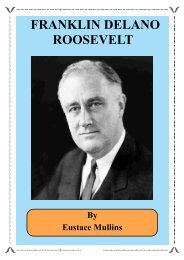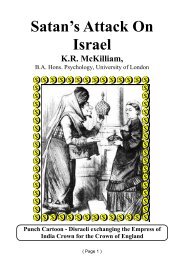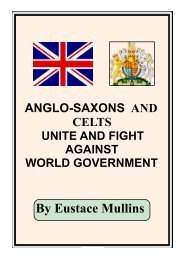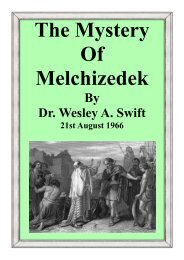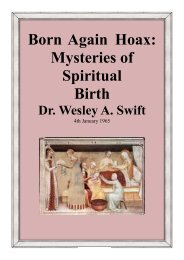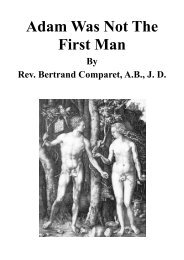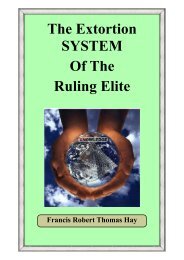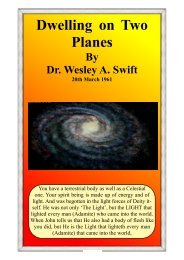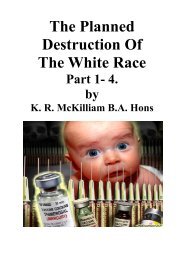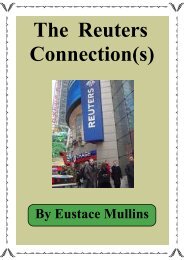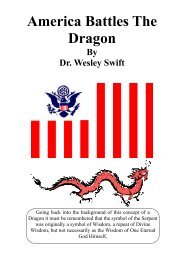Curse of Cannan - The New Ensign
Curse of Cannan - The New Ensign
Curse of Cannan - The New Ensign
Create successful ePaper yourself
Turn your PDF publications into a flip-book with our unique Google optimized e-Paper software.
year 1886, it was apparent that these nations could no longer survive these enormous<br />
expenditures; they must either collapse into internal revolution, or embark on fullscale external<br />
war.<br />
<strong>The</strong> European economies staggered on for nearly three decades, with no relief in sight. <strong>The</strong>se<br />
were the years, we might recall, which have been termed the "Golden Years" <strong>of</strong> Europe. Art,<br />
music, and Cultural institutions flourished in spite <strong>of</strong> the Canaanite conspiracies. However, it<br />
was soon to be thrown on the block. <strong>The</strong> way out <strong>of</strong> their dilemma was granted by a curious<br />
American, <strong>of</strong> undefined origins, a dour academic who convinced the bankers <strong>of</strong> Wall Street that<br />
he was their man. Woodrow Wilson was elected President, and he signed the Federal Reserve<br />
Act into law. A few months later, World War One was under way.<br />
During the years immediately preceding the World War, there was a continuous outflow <strong>of</strong><br />
emigrants from Europe to the United States. <strong>The</strong>y had found that "the Golden Years" were not<br />
golden for those who had no gold. <strong>The</strong> masters <strong>of</strong> the Order, the Canaanites, floated from country<br />
to country and from great estate to great estate on a sea <strong>of</strong> champagne, but for most Europeans,<br />
life was brutal and short. <strong>The</strong>y did not flee' 'the good life"; they were searching for it.<br />
At a millionaires' club on Jekyl Island, Georgia, in November, 1910, the problem <strong>of</strong> financing<br />
a world war was resolved. Paul Warburg, <strong>of</strong> Kuhn, Loeb Co., and Henry P. Davison, <strong>of</strong> J. P.<br />
Morgan Co., met with Senator Nelson Aldrich (after whom Nelson Rockefeller was named) to<br />
secretly draft a plan for an American central bank. Seventy-five years later, it is impossible to<br />
find any Establishment scholar or historian who has ever heard <strong>of</strong> the Jekyl Island meeting. <strong>The</strong>y<br />
earn their comfortable salaries by concealing from the public what has taken place.<br />
<strong>The</strong> people <strong>of</strong> Shem had always opposed a central bank, fearing its power over them. Now the<br />
Congressmen, led by Congressman Charles A. Lindbergh, Sr., waged a gallant struggle against<br />
the power <strong>of</strong> Wall Street money. <strong>The</strong> Wall Street money won. On December 23, 1913, a<br />
significant year in Masonry, Wilson signed the Federal Reserve Act into law. <strong>The</strong> American<br />
people were now poised for a great roller coaster ride, up and down from depression to prosperity<br />
and back again, and from world war to world war.<br />
<strong>The</strong> actual planning for the outbreak <strong>of</strong> World War I had been in operation for some years. <strong>The</strong><br />
fuse was to be lit by the assassination <strong>of</strong> Archduke Ferdinand, the heir to the throne <strong>of</strong> the<br />
Austro-Hungarian Empire. His murder was carried out at Sarajevo on June 28, 1914. Within a<br />
few weeks, the nations <strong>of</strong> Europe were at war.<br />
Surprisingly enough, the approaching fate <strong>of</strong> the archduke had been widely known for some time<br />
to European politicians, including the Archduke himself. Cassell's "<strong>The</strong> World War," p. 45,<br />
quotes Count Ottkar Czernin, the Austrian Foreign Minister: "A fine quality <strong>of</strong> the Archduke<br />
was his fearlessness. He was quite clear that the danger <strong>of</strong> an attempt to take his life would always<br />
be present, and he <strong>of</strong>ten spoke quite simply and openly <strong>of</strong> such a possibility. A year before the<br />
outbreak <strong>of</strong> war, he informed me that the Freemasons had resolved to kill him." This is not as<br />
startling a revelation as it may seem. <strong>The</strong> Masonic Order <strong>of</strong> Canaanites has always relied upon<br />
murder and assassination as the key elements in its march to world power; many royal heads<br />
have fallen before their lust for vengeance.<br />
On July 11, 1914, Horatio Bottomley published in John Bull a document obtained from the<br />
Serbian Legation in London, dated April 14, 1914, which was found to be in "crude Spanish,"<br />
and which was decoded to reveal an <strong>of</strong>fer <strong>of</strong> two thousand pounds for "eliminating" Ferdinand.<br />
Pr<strong>of</strong>. R. W. Seton-Watson, in his book, "Sarajevo," p. 127, notes that "crude Spanish is really<br />
the dialect employed by the Jews <strong>of</strong> Salonika, and that the man who hawked this document round<br />
several London newspaper <strong>of</strong>fices and was eventually accepted by the sensation-loving<br />
Bottomley, was a Salonikan Jew. This suggests some connection with the Committee for Union<br />
and Progress, which had centered in the Jewish lodges <strong>of</strong> Salonika until the expulsion <strong>of</strong> the<br />
Turks eighteen months previously, and whose course was actively hostile to Serbia."<br />
( Page 98)



